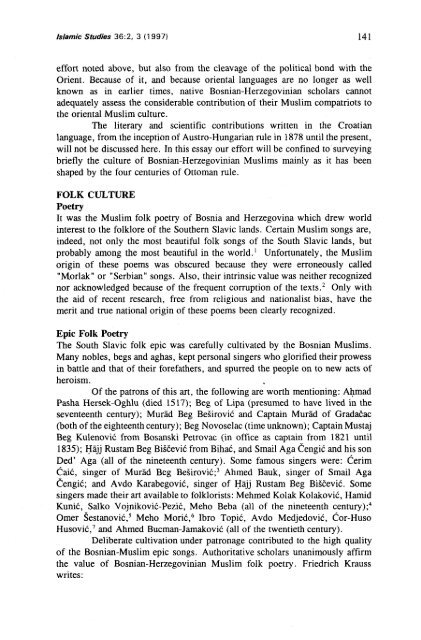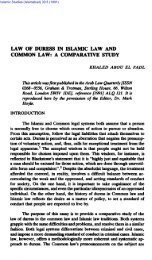Create successful ePaper yourself
Turn your PDF publications into a flip-book with our unique Google optimized e-Paper software.
Islamic Studies 36:2, 3 (1 997) 141<br />
effort noted above, but also from the cleavage of the political bond with the<br />
Orient. Because of it, and because oriental languages are no longer as well<br />
known as in earlier times, native Bosnian-Herzegovinian scholars cannot<br />
adequately assess the considerable contribution of their Muslim compatriots to<br />
the oriental Muslim culture.<br />
The literary and scientific contributions written in the Croatian<br />
language, from the inception of Austro-Hungarian rule in 1878 until the present,<br />
will not be discussed here. In this essay our effort will be confined to surveying<br />
briefly the culture of Bosnian-Herzegovinian Muslims mainly as it has been<br />
shaped by the four centuries of Ottoman rule.<br />
FOLK CULTURE<br />
Poetry<br />
It was the Muslim folk poetry of Bosnia and Herzegovina which drew world<br />
interest to the folklore of the Southern Slavic lands. Certain Muslim songs are,<br />
indeed, not only the most beautiful folk songs of the South Slavic lands, but<br />
probably among the most beautiful in the world.' Unfortunately, the Muslim<br />
origin of these poems was obscured because they were erroneously called<br />
"Morlak" or "Serbian" songs. Also, their intrinsic value was neither recognized<br />
nor acknowledged because of the frequent corruption of the texts.2 Only with<br />
the aid of recent research, free from religious and nationalist bias, have the<br />
merit and true national origin of these poems been clearly recognized.<br />
Epic Folk Poetry<br />
The South Slavic folk epic was carefully cultivated by the Bosnian Muslims.<br />
Many nobles, begs and aghas, kept personal singers who glorified their prowess<br />
in battle and that of their forefathers, and spurred the people on to new acts of<br />
heroism.<br />
Of the patrons of this art, the following are worth mentioning: wmad<br />
Pasha Hersek-Oghlu (died 1517); Beg of Lipa (presumed to have lived in the<br />
seventeenth century); Mur2d Beg BeSiroviC and Captain Muriid of Gradatac<br />
(both of the eighteenth century); Beg Novoselac (time unknown); Captain Mustaj<br />
Beg KuienoviC from Bosanski Petrovac (in office as captain from 1821 until<br />
1835); Hgjj Rustam Beg BiSEeviC from BihaC, and Smail Aga Cengi6 and his son<br />
Ded' Aga (all of the nineteenth century). Some famous singers were: ~erim<br />
CaiC, singer of Mursd Beg BeSir~viC;~ Ahmed Bauk, singer of Smail Aga<br />
CengiC; and Avdo KarabegoviC, singer of H2jj Rustam Beg BiSEeviC. Some<br />
singers made their art available to folklorists: Mehmed Kolak KolakoviC, Hamid<br />
KuniC, Salko Vo.jnikoviC-PeziC, Meho Beba (all of the nineteenth ~entury);~<br />
Omer Sestanovi~,~ Meho MoriC,'j Ibro TopiC, Avdo MedjedoviC, or-~uso<br />
HusoviC,' and Ahmed Bucman-JamakoviC (all of the twentieth century).<br />
Deliberate cultivation under patronage contributed to the high quality<br />
of the Bosnian-Muslim epic songs. Authoritative scholars unanimously affirm<br />
the value of Bosnian-Herzegovinian Muslim folk poetry. Friedrich Krauss<br />
writes:
















